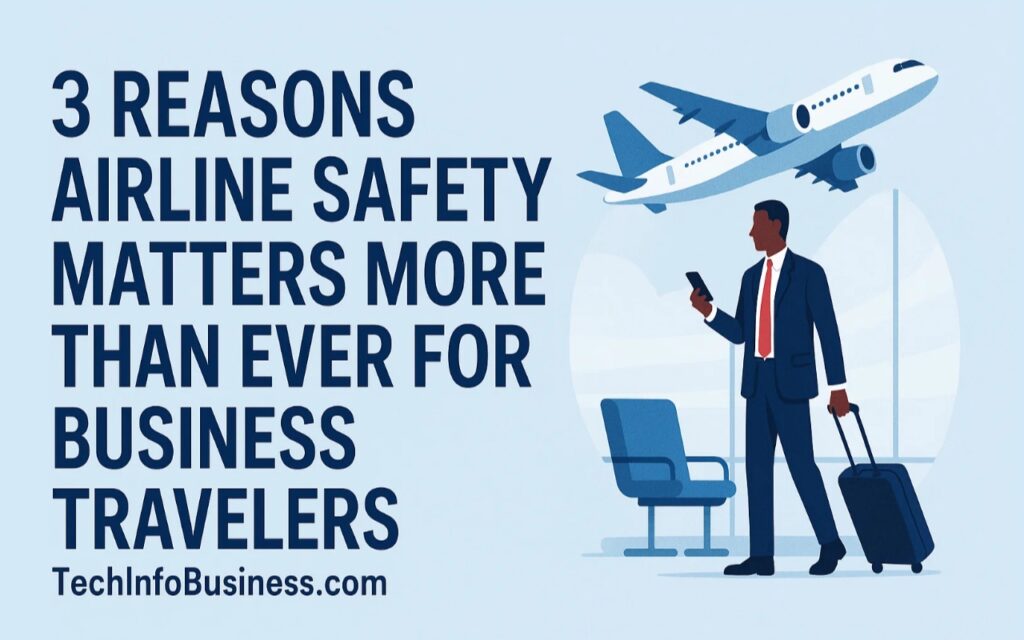Business travel is creeping back into the spotlight. A few years ago, the idea of hopping on a plane for a single meeting felt outdated, even reckless, but here we are again. Companies are sending staff back across borders, partly because video calls can only do so much, and partly because clients still value the personal handshake. But here’s the thing: with the return to business travel happening in force, airline safety is no longer some background detail. It’s right at the front.
When managers are booking flights now, they aren’t just asking: “How much does it cost?” or “Does it connect at the right time?” They’re asking: “Can I trust this airline with my people?” That’s where lists like safe airlines come into play. Because sure, we all know modern flying is safe compared to most forms of travel. But when it comes to putting employees in the air – sometimes halfway across the world – small percentages suddenly matter a lot more.
1. Safety and Business Continuity Go Hand in Hand
Think about what happens when a flight doesn’t go as planned. It’s not just a missed connection – it can snowball into lost deals, cancelled presentations, and even client trust slipping away. A single delayed meeting can cost more than the flight itself. When you zoom out, you start seeing airline safety not just as a health issue but as a business continuity one.
The thing is, airline safety isn’t just about big catastrophic accidents – those are very rare worst cases. What it’s really about is the boring, regular and ongoing maintenance and safety checks that need done day to day and between every flight. It’s also about how often they have disruptions to flights due to safety issues, and/or if they communicate these honestly with their passengers. A company that shrugs off these details is basically gambling with its own schedule. Many travel managers now look up airline ratings before booking. These ratings aren’t perfect, but they’re a lot better than guessing.
2. Employees Want to Feel Looked After
Corporate culture has shifted. Years ago, an employee might have accepted a budget flight without asking questions. Today, staff notice when corners are being cut – and they talk about it. If you send employees on a budget airline with a poor safety record to save a measly $200 that’s going to reflect pretty badly on your brand over time.
It’s not only about accidents. Employees feel safer and more valued when they know their company books reputable carriers. That sense of being looked after travels back with them. It shows up in morale, in loyalty, even in productivity. And let’s be blunt: if something were to happen, and the company had ignored obvious safety data, the fallout wouldn’t just be emotional. There would be financial and legal questions too. Choosing safer airlines isn’t overprotective – it’s just smart HR.
3. Brand Reputation Travels Too
Here’s the other angle many forget: clients pay attention. If your executives are spotted boarding airlines with questionable safety records, it doesn’t exactly scream reliability. Reputation spreads quickly – inside your company and outside.
Some firms even take it further by exploring private jets for key personnel. Of course that is at the extreme end of things, and can’t be provided for regular business travellers or even C-level employees in all but the biggest global companies. However, they can be strategically utilized for key negotiations or high profile meetings that are worth several millions of dollars. In these cases, the appearance of the party you sends can matter as much as what they say and offer.
Your key negotiator stepping off a budget airline with a poor safety record is not going to create a good impression.
Wrapping Things Up
In today’s business world, flights aren’t just flights. They’re investments in deals, relationships, and reputation. That’s why airline safety matters more than ever. It protects continuity, shows employees they’re valued, and reinforces a company’s brand.
The odds of something going wrong in the air are tiny, but the risks of ignoring safety data are much bigger than most people realise. So before booking the next round of flights, it’s worth asking: are we choosing carriers for price, or for peace of mind? Companies that pick the second option tend to come out ahead in ways that go far beyond the balance sheet.



